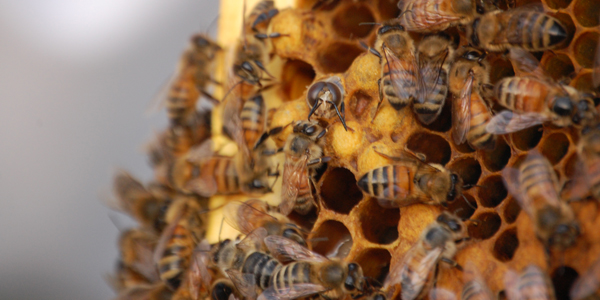Why Bees Are Spontaneously Leaving Their Hives

For years Science has been stumped by the phenomena of worker bees seemingly up and abandoning their colonies for no reason. Colony Collapse Disorder causes the hive to die when it was otherwise seen as seemingly healthy prior to the event. Bee farmers have had their honey affected, and populations of bees internationally has experienced a dip. Now, it appears that chemicals on insecticides may hold the key to the eight year puzzle.
Formerly CCD was believed to be caused by anything from radiation to genetically modified crops. Now, Forbes reports that insecticides seem to be causing the problem according to a study from the Harvard School of Public Health. Researchers believed the cause of the disorder was linked to an insecticide used to protect crops called neonicotinoids. Neonicotinoids receive their namesake as they are chemically similar to the nicotine found in tobacco products. To test their theory, twelve hives of honey bees were exposed to sublethal levels and were monitored to see what would happen to the bees.
After two seasons following the exposure six of the twelve hives were abandoned. Out of those six it was revealed that one of the hives was abandoned due to a fungal infection. While the numbers are highly variable with such a small sample size, the results support a past study in 2012 in which 94% of the hives were vacated after exposure to the neonicotinoids. So how in the outside world are these bees exposed to the chemical?
Worker bees who are out on the hunt for pollen are attaching themselves to the crops that contain the insecticide. While not lethal to the bees, their carrying of the treated pollen are causing a disturbance back at the hive supposedly. This breakthrough will undoubtedly help honey bee populations and serve as evidence towards legislation limiting or banning the use of neonicotinoids in future insecticides for the United States. It will also likely help the honey supply of the world, which could see a decline if the trend continues. Good thing, as a world without honey would be bittersweet for future generations to be sure.
CINEMABLEND NEWSLETTER
Your Daily Blend of Entertainment News

Mick Joest is a Content Producer for CinemaBlend with his hand in an eclectic mix of television goodness. Star Trek is his main jam, but he also regularly reports on happenings in the world of Star Trek, WWE, Doctor Who, 90 Day Fiancé, Quantum Leap, and Big Brother. He graduated from the University of Southern Indiana with a degree in Journalism and a minor in Radio and Television. He's great at hosting panels and appearing on podcasts if given the chance as well.

I Finally Started Watching Severance And I Gotta Talk About The Clever Use Of Metallica's ‘Enter Sandman’

WWE's Asuka Sends Serious Message To Fans Seemingly Tied To Inappropriate Interactions

Terrifier 4’s Director Offers Thrilling Update On The Next Slasher And Teased Something I’ve Been Wondering About For Years
Most Popular







